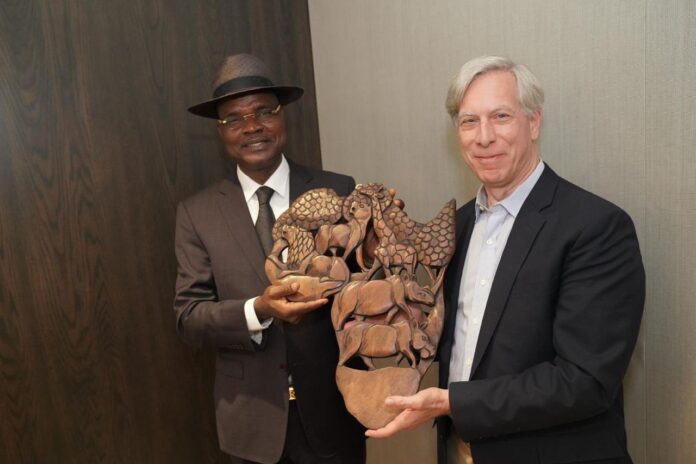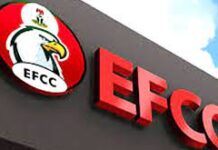- School lauds Dr Igwe on organic business growth
The School of Advanced International Studies (SAIS) at the Johns Hopkins University, Baltimore, United States, has commended the Executive Chairman of Mainland Oil and Gas Limited, Dr Chris Igwe, on providing the global business community with great insights into driving organic business growth in a depressed economic environment.
The commendation came from the Chief host and the Chairman of African Focus Area at John’s Hopkins University, Prof peter Lewis, in response to a compelling lecture delivered by Dr Igwe on “Contemporary Issues Related To Governance, Entrepreneurship And Energy Development in Nigeria.”
Prof Lewis who thanked Dr Igwe for a powerful lecture stated that the presentation provided business players with great insights into the Nigerian operating environment. He also applauded Dr Igwe on his great business success and the growth of the Chrisnak Group.
In the lecture he delivered at the university, Dr Igwe used the Chrisnak Group and Mainland Oil and Gas as reference cases to demonstrate how private enterprises, in harmony with good regulatory agencies, could be a crucial avenue for productively engaging Nigeria’s burgeoning population.
SAIS interdisciplinary curriculum is grounded in the study of international economics, international relations, and regional studies. The school prepares professionals to address the multifaceted challenges facing the world today.
In delivering a public lecture at the school, Dr Igwe pointed out that investors aspiring to explore the wealth of opportunities in the Nigerian business environment need to embrace compliance and foster partnerships and collaborations with government agencies and regulators in order to drive mutually beneficial growth.
He also tasked players in the petroleum industry to cultivate the necessary capacity, capability, networks, and partnerships to not only survive but thrive in the dynamic Nigerian energy landscape.
Dr Chris Igwe, who is also the Executive Chairman of the Chrisnak Group, declared in a lecture he delivered at the Johns Hopkins School of Advanced International Studies that positive working relationship with the Nigerian government entails incorporating community stakeholding through employment opportunities and sustainable development initiatives in all industry operations.
In laying time tested success templates for investors exploring opportunities in the Nigerian energy industry at the international intellectual debate, Dr Igwe cited the example of companies in operated Chrisnak Group, saying: “We prioritize talent development, recruiting and grooming individuals from within these communities, while upholding the highest standards of governance and sustainability throughout our value chains.”
“As the industry continues to evolve, we firmly believe that bold and courageous entrepreneurs will seize the vast potential that lies within the Nigerian energy landscape. The stage is set, and the future is bright for those who dare to innovate and lead,” Dr Igwe declared.
In delivering a compelling lecture titled “Contemporary Issues Related to Governance, Entrepreneurship, and Energy Development in Nigeria,” Dr. Chris Igwe provided a detailed account of how his company has successfully navigated the complex Nigerian business environment to become a strategic player in the country’s energy market.
His insights not only shed light on the intricate challenges businesses face in Nigeria but also offered a blueprint for overcoming these obstacles through entrepreneurship, strategic governance, and sustainable development.
Nigeria, with its vast reserves of oil and gas, holds a significant position in the global energy market. However, the local operating environment is fraught with challenges that can hinder business growth and sustainability. Key among these challenges are policy inconsistency, lack of transparency, inadequate investment capital, and security concerns.
Despite these formidable challenges, Mainland Oil & Gas Limited, under the leadership of Dr. Chris Igwe, has managed to not only survive but thrive in Nigeria’s energy sector. The company’s journey from a modest trading entity to a significant player in the downstream oil market exemplifies how strategic entrepreneurship and governance can overcome local challenges.
Dr Igwe stated that one of the key strategies employed by Mainland Oil & Gas has been its focus on building and investing in critical infrastructure for consistent product availability and efficient distribution.
The company has since developed state-of-the-art tank farms and automated retail outlets in order to maintain a reliable supply chain even in the face of market volatility. The strategies have set the company apart from competitors who struggle with inconsistent supply.
Dr. Igwe’s lecture emphasized the importance of agility in navigating Nigeria’s often unpredictable policy landscape. He narrated how Mainland Oil has cultivated a corporate culture that prioritizes adaptability and swift response to regulatory changes. And by maintaining close relationships with government agencies and staying informed of potential policy shifts, he narrated, the company has been able to adjust its operations proactively, ensuring compliance and minimizing disruption.
Dr Igwe pointed at transparency as a core value with which Mainland has implemented rigorous internal controls and governance frameworks that ensure all operations are conducted with the highest level of integrity. He added that the commitment to transparency has not only helped the company build trust with stakeholders but has also positioned it as a reliable partner in an industry where trust is often in short supply.
On funding of his businesses in an illiquid domestic financial market, Dr Igwe stated that the company’s entrepreneurial approach involves leveraging relationships with both local and international financial institutions, as well as reinvesting profits into growth initiatives. This strategy has enabled Mainland Oil & Gas to expand its operations without relying solely on external investment, giving it greater control over its growth trajectory.
He also rooted the initial venture capital supporting the company back to a $250 capital settlement he received from his business mentor under the Igbo apprenticeship scheme, explaining that the seed capital had helped build the entire Chrisnak Group of companies.
The Igbo apprenticeship scheme, he explained, been described as the world’s largest venture capital organization, as apprentices are started o???? with small amounts of money, goods, and valuable connections.
“Entrepreneurship is a crucial avenue for productively engaging this burgeoning population. This resonates deeply in Southeastern Nigeria, where entrepreneurship is woven into the fabric of Igbo culture. Over time, we have developed a system for cultivating entrepreneurs through apprenticeship schemes,” he told the audience; explaining that young people participate in these apprenticeship schemes and acquire the requisite skills, knowledge, and connections needed to build their own businesses.
“Many start modestly, and eventually evolving into larger enterprises.”
On enhancing security and community relations, Dr Igwe stated that Mainland Oil has implemented a multi-layered security approach that includes partnerships with local communities, federal security agencies, and the use of advanced technology such as CCTV and automated communication systems.
This proactive stance, according to him, has significantly reduced the risk of disruptions and ensured the safety of the company’s operations and personnel.
He added that the company has also placed a strong emphasis on community engagement as a strategy to mitigate security risks. And by investing in local communities through employment opportunities, infrastructure development, and social initiatives, the company has fostered goodwill and reduced the likelihood of conflicts that could impact its operations.
Dr. Chris Igwe’s lecture at Johns Hopkins highlighted not only the challenges of operating in Nigeria’s energy sector but also the opportunities that exist for businesses willing to innovate and adapt.
He pointed at the success story of Mainland Oil & Gas Limited as a testament to the power of strategic entrepreneurship and governance in overcoming local challenges. He added that the company’s strategies on infrastructure development, maintaining transparency, securing capital, and enhancing security, have laid a solid foundation for sustainable growth.
He clarified that the company’s commercial success stems from a deep-rooted entrepreneurial spirit, which has driven its expansion from a modest trading company into a major player in Nigeria’s downstream oil sector with growing interests in midstream and upstream activities.

























